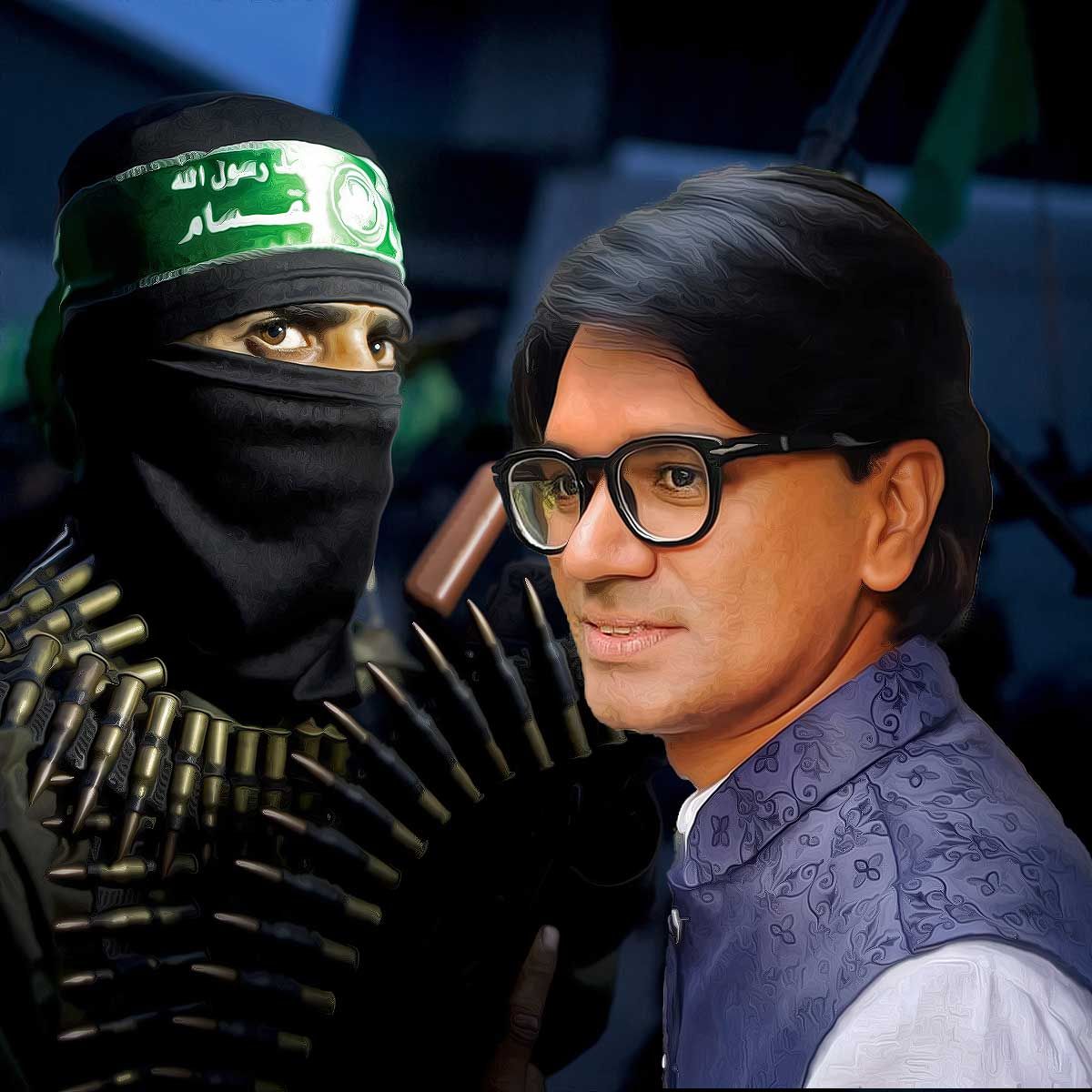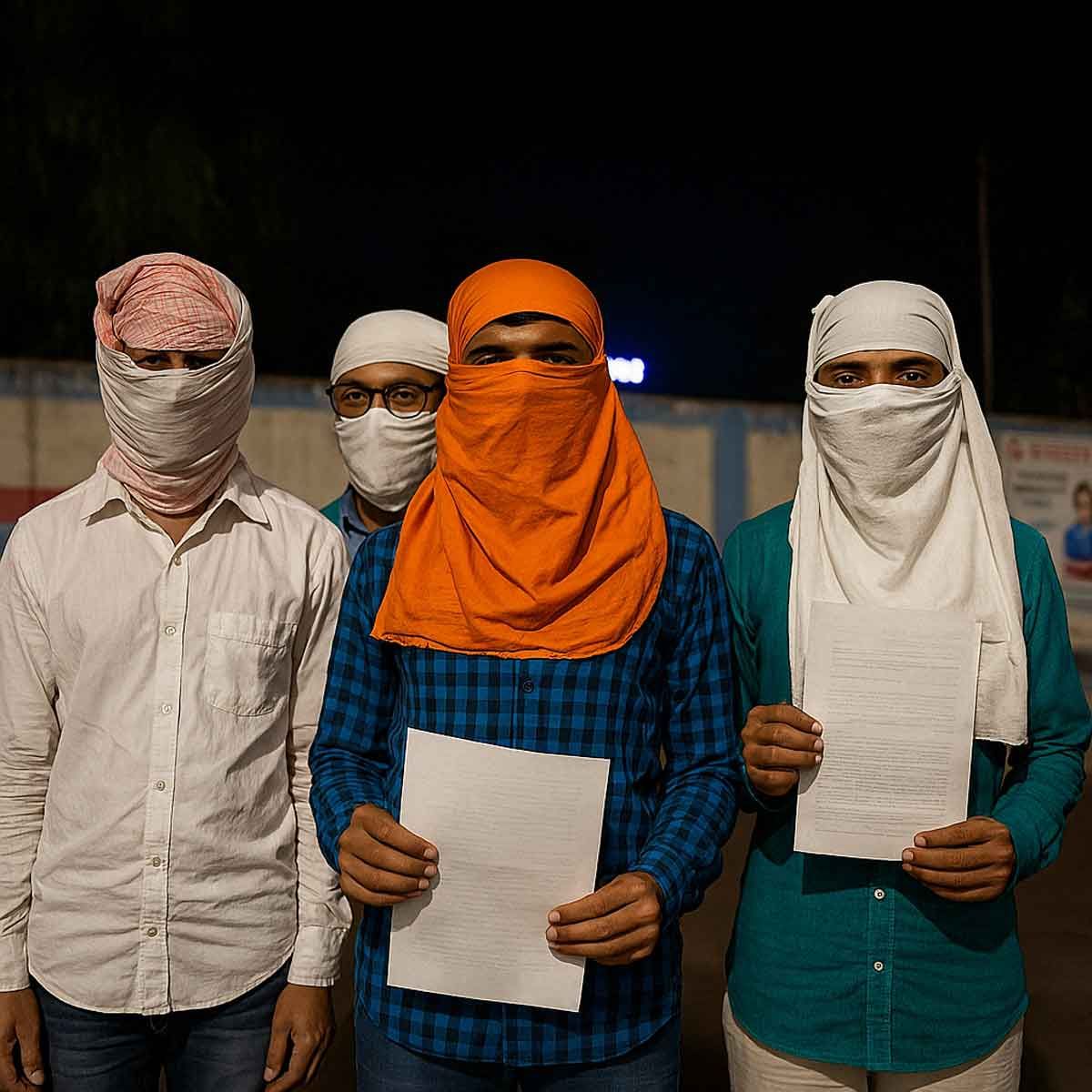More Coverage
Twitter Coverage
Satyaagrah
Written on
Satyaagrah
Written on
Satyaagrah
Written on
Satyaagrah
Written on
Satyaagrah
Written on
JOIN SATYAAGRAH SOCIAL MEDIA
"Fact-Fiction's Frontier": American journalist Amy Mek warns of AltNews' Mohammed Zubair's attempts to tarnish her and other conservatives for revealing Hamas propaganda, accuse him of peddling disinformation, and potential ties to anti-India funders

In an era where misinformation spreads like wildfire, it is imperative for journalists and fact-checkers to remain true to their purpose: to provide accurate, unbiased information. However, as Amy Mek, the founder of RAIR Foundation USA, points out, not all who claim to be fact-checkers operate with such integrity.
Recently, Amy Mek, an esteemed American journalist, raised serious concerns about the credibility and intentions of AltNews, a self-proclaimed fact-checking website, and its co-founder, Mohammed Zubair. Her allegations were not baseless. Drawing a parallel with the unsettling case of former BJP Spokesperson Nupur Sharma, Mek emphasized how Zubair had put her in harm's way, similar to what Sharma had experienced.
|
Mek's revelations come at a crucial time. She took to her platform, [X], to shine a spotlight on the tactics employed by Zubair. Labeling him as a 'Jihadi', she boldly questioned his intentions behind running AltNews, suggesting that it serves more as a tool for smear campaigns rather than genuine fact-checking. Mek's primary contention lies in how Zubair's actions are seemingly aimed at those who actively work towards unveiling the propaganda of notorious terrorist organizations like Hamas.
"Is Mohammed Zubair the same individual who jeopardized the safety of Nupur Sharma merely for referencing Islamic scriptures?" she asked her followers, urging them to see the pattern in Zubair's actions. Such questions are not only valid but essential in today's digital age, where misinformation can have dire consequences.
The world relies on journalists and fact-checkers to be the gatekeepers of truth. However, when these very individuals misuse their platforms for personal vendettas or to further specific agendas, it raises concerns about the authenticity of the information we consume daily. Zubair's alleged actions, as highlighted by Amy Mek, serve as a stark reminder of this very threat.
It is commendable that journalists like Amy Mek are fearless in their pursuit of truth, even when faced with potential threats. Her dedication to exposing the reality behind entities like AltNews and individuals like Mohammed Zubair underscores the importance of genuine journalism in today's society.
|
In a significant alert to her Indian followers, Amy Mek shared a warning about Mohammed Zubair, co-founder of AltNews. Mek described him as an operative behind a "left-wing disinformation site," accusing him of attempting to tarnish her reputation and that of other conservatives. The reason? Their relentless efforts to debunk the propaganda spread by notorious terrorist groups such as Hamas.
Mek's tweet read:
"@AmyMek: "ALERT: To my followers in India... There seems to be a Jihadi named Mohammad Zubair who operates a left-wing disinformation site called Alt News. He is attempting to smear me and other conservatives for exposing Hamas' propaganda. Is this the same antisemitic/hinduphobic individual who targeted Nupur Sharma and endangered her life? This was simply because she reported factual information about Prophet Muhammad and the age of one of his wives, Aisha. She noted that Aisha was 6 years old when married and 9 when the marriage was consummated. (for anyone who needs to hear this - that makes him a pedophile. You already know he was a narcissist, molester, mass murderer, terrorist, misogynist, lecher, cult leader, madman rapist, torturer, assassin, and looter - prove me wrong). I also heard that he was arrested in India and seems to be a dangerous individual who encourages his followers to harass people. Is it true that he has received money from George Soros's Open Society Foundations (OSF), which supports anti-India elements operating within India? Is it true that he has doxxed people as well? Can you share more information about him - thanks for your help!"
The tweet underscores the risks posed by those who misuse their platforms to spread false narratives and target individuals. Amy's mention of Nupur Sharma's ordeal is especially poignant, drawing attention to the dangers that journalists and truth-seekers face when they confront such entities.
|
Furthermore, Mek's concerns about Zubair's connections with external funding sources like George Soros's Open Society Foundations (OSF) and his potential involvement in doxxing raise pertinent questions about the motivations behind such disinformation campaigns.
In a world where the truth is often muddied by lies, it is essential for individuals to be wary of the sources they trust. Amy Mek's alert serves as a crucial reminder of the threats lurking in the digital space and the need for constant vigilance.
While digital platforms have provided a stage for myriad voices, they have also become battlegrounds of conflicting narratives. At the heart of the recent uproar involving Mohammed Zubair and Amy Mek lies a controversy surrounding Nupur Sharma, the former spokesperson of BJP.
|
Sharma's comments, which triggered the entire sequence of events, were centered on the age of Prophet Muhammad's wife, Aisha. As she pointed out, "This was simply because she (Nupur Sharma) reported factual information about Prophet Muhammad and the age of one of his wives, Aisha. She noted that Aisha was 6 years old when married and 9 when the marriage was consummated." This statement, albeit rooted in Islamic scriptures, ignited a firestorm of reactions.
The context to this revelation is equally significant. On 26th May 2022, Sharma was a part of a heated debate on Times Now, discussing the Gyanvapi disputed structure case. During this debate, a co-panelist from the Muslim community hurled derogatory remarks towards Bhagwan Shiv. Sharma, in retaliation, chose to shed light on what Islamic scriptures convey about Prophet Muhammad. It's noteworthy that her statements align with those mentioned by several Islamic scholars, including the controversial figure, Zakir Naik.
This incident highlights the volatile nature of public debates, especially when they tread the sensitive lines of religion. It underscores the need for responsible journalism and the importance of contextual understanding, especially when discussing topics that hold immense religious significance.
|
Following a heated debate on Times Now, Zubair took it upon himself to trim a video clip in a way that painted BJP spokesperson, Nupur Sharma, in a negative light. He conveniently omitted the part where a Muslim speaker had used derogatory language for the revered Shivling, choosing instead to start the clip with Sharma's stern warning against abusing Hindu religion and its deities. This selective editing, coupled with Zubair's inflammatory tweet, was a blatant attempt to twist the narrative to suit his agenda.
Zubair's tweet read, “Prime Time debates in India have become a platform to encourage hate mongers to speak ill about other religions. Times Now’s Anchor Navika Kumar is encouraging a rabid communal hatemonger & a BJP Spokesperson to speak rubbish that can incite riots. Shame on you, Vineet Jain.” This misleading portrayal not only targeted Nupur Sharma but also attempted to tarnish the reputation of Times Now and its anchor, Navika Kumar.
Such deliberate misrepresentation can have far-reaching consequences in a diverse nation like India, where religious sentiments run deep. By selectively showcasing only one side of the story, Zubair not only compromised journalistic integrity but also played with fire by stoking communal tensions.
|
Zubair's approach to the Nupur Sharma case is a testament to his calculated tactics. Rather than addressing the nuances of the debate, he drew attention to Sharma's comments about Prophet Muhammad, casting her in a negative light. By doing so, he not only misrepresented her stance but also insinuated that her suspension from the BJP was due to blasphemy. The consequences of such a portrayal were immediate and severe. It didn't take long for radical "Islamists" to jump on the bandwagon, issuing threats and, shockingly, even acting upon them, as evident from the horrifying incident involving a tailor who supported Sharma.
The irony is palpable. Zubair, in his self-righteous attempt to defend the honor of the Prophet, seemed to have forgotten that the very remarks by Sharma he took issue with have been debated among Islamic scholars themselves. The Hadith, a collection of sayings and actions of Prophet Muhammad, has varying interpretations. Sharma's comments, whether one agrees with them or not, are part of a larger discourse that seeks to understand the Prophet's life from different perspectives.
By choosing to zero in on one interpretation and presenting it as an affront to the entire Muslim community, Zubair displayed a concerning lack of intellectual honesty. He played into the hands of those who believe they have a monopoly over religious sentiment and the right to be offended. Such a stance not only stifles genuine debate but also sows the seeds of division.
|
Portraying himself as a defender of free speech, he cunningly navigated the domain of social media to push his divisive agenda.
His behavior surrounding the Nupur Sharma controversy reveals his true intentions. Instead of promoting healthy dialogue, he chose to twist facts, manipulate narratives, and endanger the lives of those he disagreed with. It's alarming how a single tweet from Zubair, riddled with selective editing and out-of-context clips, led to an onslaught of threats against Sharma. Rape and death threats began pouring in within an hour of his tweet, demonstrating the immense influence he holds over his followers.
It took the threat of beheading for Zubair to finally condemn the violent actions of his followers. But by then, the damage was done. The narrative had been picked up by international media houses, casting a shadow over India's image on the global stage. The British online paper, Independent, did not shy away from pinning the initiation of the attack squarely on Zubair, shedding light on his role in perpetuating hate and division.
Amy Mek, in her post, reinforces the growing concerns about Zubair's dangerous tendencies. Highlighting his history with Indian agencies, including a past arrest, she paints a picture of a man who not only spreads false narratives but also encourages his followers to engage in harassment and violence.
|
Amy Mek's concerns about him are not unfounded, as she delves deeper into his connections and motivations.
One of the pressing concerns Mek raised was about Zubair's alleged financial ties with George Soros’s Open Society Foundations (OSF). OSF has been linked to supporting anti-India elements, and if the allegations hold, it raises significant questions about Zubair's role in the larger geopolitical narrative against India.
But what's even more alarming than potential external alliances is Zubair's history of 'doxxing'. For those unfamiliar, doxxing is the act of publishing private information about someone without their consent, usually for malicious intent. Zubair's notoriety in this area is well-documented. By leaking sensitive private information, he's not only infringing upon a person's privacy but also endangering their lives. This kind of behavior goes beyond the realm of fact-checking and enters a darker space of targeted harassment.
Mek's appeal to Indians to shed more light on Zubair isn't just about gathering information. It's a call for collective vigilance, a reminder that democracy thrives on transparency and accountability. But when individuals misuse their platforms to stifle debate and endanger lives, it corrodes the very foundation of that democracy.
|
The Sacred Right to Free Speech: A Double-Edged Sword
The evolution of societies is often marked by their embrace of certain ideals over others. One such ideal that has shaped the modern world is the right to free speech. In the labyrinth of history, it was the audacity to question, to challenge, and yes, to offend, that pushed humanity out of the shadows of ignorance and into the enlightenment of the Renaissance.
Western liberal democracies, with their roots steeped in the age of enlightenment, have always championed the right to offend. It is seen not as an act of rebellion, but as a necessity for reform. Through challenging established norms and pushing boundaries, societies evolve, innovate, and improve. The freedom to speak one's mind, even if it offends another, is guarded with a zeal that has, in many ways, defined the essence of western democracies.
|
However, India presents a nuanced narrative. The world's largest democracy, with its rich tapestry of cultures, religions, and traditions, has had to grapple with the balance between free speech and maintaining societal harmony. The first amendment to the Indian Constitution, which grants the right to free speech with certain restrictions, embodies this complex interplay. It grants individuals the right to express, but also gives space for taking offense, sometimes even on matters that might seem trivial to an external observer.
This duality, this tightrope walk between freedom and restraint, has led to numerous debates, controversies, and legal battles. The cases of Nupur Sharma and Mohammed Zubair are just recent examples in a long history of such incidents. They serve as reminders of the urgent need to reassess and recalibrate the balance.
|
For India to truly harness the transformative power of free speech, it must look beyond the superficialities of offense and delve deeper into the essence of expression. The moment to liberate free speech from the chains of vaguely defined laws and regulations is not just imminent but imperative. Only then can the nation move forward, with the assurance that every voice, no matter how dissenting, has the right to be heard.
 Support Us
Support Us
Satyagraha was born from the heart of our land, with an undying aim to unveil the true essence of Bharat. It seeks to illuminate the hidden tales of our valiant freedom fighters and the rich chronicles that haven't yet sung their complete melody in the mainstream.
While platforms like NDTV and 'The Wire' effortlessly garner funds under the banner of safeguarding democracy, we at Satyagraha walk a different path. Our strength and resonance come from you. In this journey to weave a stronger Bharat, every little contribution amplifies our voice. Let's come together, contribute as you can, and champion the true spirit of our nation.
 |  |  |
| ICICI Bank of Satyaagrah | Razorpay Bank of Satyaagrah | PayPal Bank of Satyaagrah - For International Payments |
If all above doesn't work, then try the LINK below:
Please share the article on other platforms
DISCLAIMER: The author is solely responsible for the views expressed in this article. The author carries the responsibility for citing and/or licensing of images utilized within the text. The website also frequently uses non-commercial images for representational purposes only in line with the article. We are not responsible for the authenticity of such images. If some images have a copyright issue, we request the person/entity to contact us at This email address is being protected from spambots. You need JavaScript enabled to view it. and we will take the necessary actions to resolve the issue.
Related Articles
- "Fake news: the wolf in the media's clothing": Refuting claims of Saket Gokhale and others of 300% budget overshoot on G20 Summit, Govt asserted that the 'expenses directed towards permanent asset creation', shedding light on infrastructural developments
- After being slammed by Indians for fake news, Rana Ayyub is now being blasted by Saudis for supporting terrorists in her tweet "Yemen is bleeding and there is nobody to stop the bloodthirsty Saudis”
- "You disguising as fact-checker is like a terrorist talking about peace," says Venkatesh Prasad, a revered figure in cricket, boldly criticizes AltNews co-founder Mohammed Zubair, spotlighting series of tragic events fueled by misinformation & incitement
- "Urgent need for 1992 Mumbai type incidents to control cow worshipers”: Liberals and Islamist apologists threaten Hindus with bomb blasts after Fake news peddler CJ Werleman shared misleading old video to label Police as ‘Hindutva radicals’
- In a twist of irony, Alt News' Mohammed Zubair becomes the news himself, booked by UP Police for overstepping journalistic boundaries by revealing a minor's details, a reminder of the thin line between journalism and privacy invasion in digital age
- Earlier Pakistan attempted to milk the Hijab controversy and now the USA decided to meddle into India’s internal affairs by putting misleading information regarding the ongoing Hijab row in the country
- Here is a list of 20 incidents where the ‘Jai Shri Ram’ slogan has been misused to turn a random crime into ‘hate crime’
- "Twisted tales in mainstream headlines": In a fervent Lok Sabha session, Kiren Rijiju swiftly counters MP Kakoli Ghosh Dastidar's false allegations about unpaid ISRO and IIT scientists, spotlighting ongoing misinformation since the Chandrayaan-3 launch
- "Narrative Navigators": In the Israel-Hamas conflict, the BBC, after spreading misinformation on a Gaza hospital event, releases a guide on discerning disinformation, the network later conceded a correspondent's mistake in blaming an Israeli airstrike
- Propaganda techniques to blame Hindus for violence and paint Muslim aggressors as ‘good samaritans’
- Master of fabrication and deceit: 4 occasions where eminent “historian” D N Jha misled to suit the narrative
- Netizens demand action against Bollywood entertainer Swara Bhasker for peddling fake news and defaming ‘Jai Shri Ram’
- 'Cricketers who married cousins' story published by Times of India included Virender Sehwag and his wife Aarti Ahlawat, who are actually not cousins - Also used the couple as the cover photo, completely misrepresenting facts
- Bajrang Dal's peaceful rally in Mewat (mini Pakistan) is painted panic mongering by Islamist Media
- Rahul Gandhi shares fake news related to Lord Ram, twice in two days. This is what it shows




























